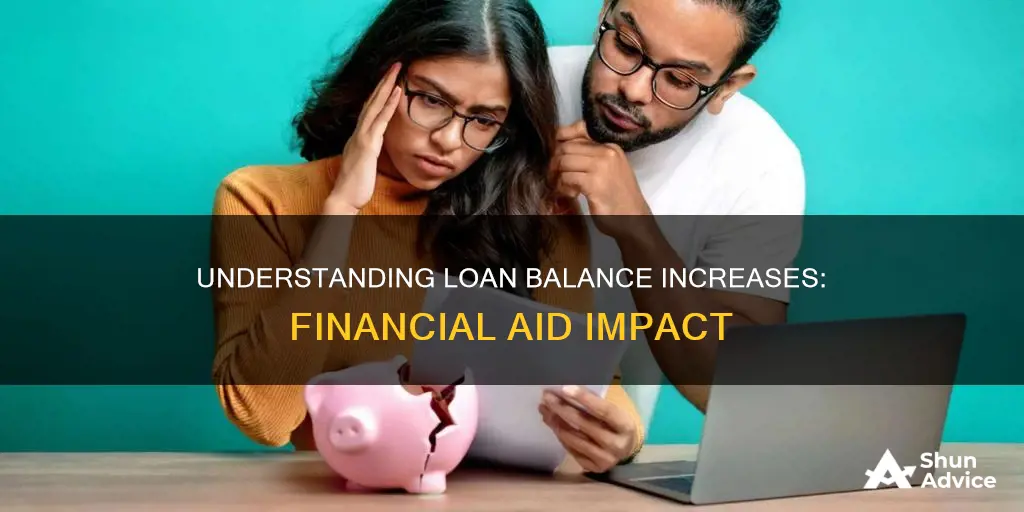
Understanding the factors that influence your total loan balance is crucial when dealing with financial aid. Interest accrual, interest capitalization, fees, deferment, forbearance, and grace periods can all increase your student loan balance over time, even if you make regular payments. To manage your financial aid effectively, it's important to stay informed about the borrowing process, your responsibilities as a borrower, and the impact of interest on your loan balance. Resources like the Annual Student Loan Acknowledgment (ASLA), College Scorecard, Dashboard, and your school's financial aid office can provide valuable insights and assistance. By making informed decisions and considering strategies such as paying more than the minimum or making extra payments, you can minimize the growth of your total loan balance.
| Characteristics | Values |
|---|---|
| Interest accrual | Increases total loan balance |
| Interest capitalization | Increases outstanding principal balance |
| Late fees | Increases total loan balance |
| Origination fees | Increases total loan balance |
| Deferment | Increases total loan balance |
| Forbearance | Increases total loan balance |
| Grace periods | Increases total loan balance |
What You'll Learn

Interest accrual
For example, if you have a student loan, interest will accrue on the total loan balance during a forbearance period, even if you are not required to make any payments. Once the forbearance period ends, the accrued interest will be added to the principal balance of your debt. As a result, you will be paying interest on both the original principal balance and the additional interest that accrued during the forbearance period.
Similarly, if you have a private student loan, the variable interest rate means that the amount of interest accruing on your debt can change depending on the Federal Reserve interest rate. As a result, your total loan balance can increase if the Federal Reserve interest rate goes up.
To minimize the impact of interest accrual on your total loan balance, there are several strategies you can consider. Firstly, try to pay more than the minimum amount each month. By informing your lender that you want the excess amount applied to the loan principal, you can lower your total loan balance and reduce your interest costs over the life of the loan. Making extra payments and paying interest while still in school can also help reduce your overall loan costs.
Additionally, it is important to understand the terms of your loan, including the repayment due dates, to avoid late fees and additional interest charges. Early repayment and a structured payback plan can also help you stay on top of your loan balance.
Title Loans in Indiana: What's the Legal Status?
You may want to see also

Interest capitalization
Interest starts to accrue (grow) from the day your loan is disbursed (sent to you or your school). At certain points in time—when your separation or grace period ends, or at the end of forbearance or deferment—your unpaid interest may capitalize. When you’re going back to school for a graduate degree, you may have started to pay back principal and interest on your undergraduate student loans. If you choose to request a student loan deferment, you won’t have to make principal and interest payments during your deferment period. However, your unpaid interest may capitalize at the end of this period.
You can lower your Total Loan Cost if you pay your interest before the capitalization period. Two of these periods are the end of your separation or grace period and the end of your graduate school deferment. If you’ve chosen the interest repayment option for your student loans, your interest shouldn’t capitalize, since you’ve paid it as it has accrued throughout school. Alternatively, if you’re making fixed payments or deferring payments until after school, try to make small additional payments. Or pay all or some of your accrued interest before your separation or grace period ends and interest capitalizes. These actions can help you avoid—or at least lower—the amount of capitalized interest after you’re out of school.
Even though your total loan balance can increase because of interest capitalization, you still have control over your loan costs. You can reduce your total loan balance by paying more than the minimum each month, making extra payments, and paying interest while in school.
Exclusive Access: Members-Only Group Benefits
You may want to see also

Fees
Many student loans have origination fees, which are charged by the lender for processing the loan. These fees are conventional, but they still contribute to the total loan balance. For example, an $800 origination fee is money out of your pocket, and it increases your loan balance. Federal loans have a guaranteed fixed interest rate, while private loans can have variable interest rates, which means the interest accrual on your debt can fluctuate.
Late fees can also increase your total loan balance. If you don't pay your loans, interest will continue to accrue, and you may be subject to late fees. This can create a cycle of increasing debt, as the interest is charged on the higher principal balance. Therefore, it is essential to understand how debt works and make a repayment plan to avoid these fees.
Additionally, interest capitalization can increase your loan balance. If you don't pay the interest on your loans as it accrues, it will be added to your outstanding principal balance at the end of the grace period or deferment period. This higher principal balance will then accrue interest, increasing the total loan cost.
To avoid increases in your total loan balance, you can make more than the minimum payment each month, make extra payments, and pay interest while still in school. These strategies can help reduce your total loan balance and interest costs over the life of the loan.
Amscot's Loan Services: What You Need to Know
You may want to see also

Deferment
There are other types of deferment, too. If you return to graduate school, you can defer your payments for up to three years, giving you time to focus on your studies without worrying about loan payments. Deferment will also postpone payments during times of financial difficulty for a period of up to one year at a time, and the maximum total deferment time is three years. There are numerous ways to qualify for this type of deferment, such as if you are currently on a deferment with Direct or Perkins. You may only be eligible if all of your outstanding loans were made on or after July 1, 1993.
It is important to note that any unpaid interest that accrues on your unsubsidised loan may be capitalised (added to your principal balance) at the expiration of a deferment, thereby increasing the total cost of your loan. However, you have the option to make payments at any time, and paying more than the minimum each month can help reduce your loan costs.
Motive Loan: Safe or Risky Option?
You may want to see also

Forbearance
It is important to note that forbearance will increase your total loan balance. To avoid this, there are several strategies you can consider. Firstly, you can make more than the minimum payment each month and let your lender know that you want the excess amount to be applied to the loan principal. This will help lower your total loan balance and reduce your interest costs over the life of the loan. Making extra payments and paying interest while you are still in school can also help reduce your total loan costs.
Additionally, it is recommended to have a savings and repayment plan in place. You can use tools such as the government's Student Aid Simulator or a Student Loan Spreadsheet to help you understand your loan and work out the numbers. This will ensure that you are prepared and know exactly how much money you owe, so you can determine how and when you will pay it off.
Loan Depot Data Breach: What Happened and Why?
You may want to see also
Frequently asked questions
The total loan balance is the principal you owe, plus any interest that accrues.
Interest accrues on the total loan balance, increasing the amount you owe over time. The interest rate may be fixed or variable, depending on the type of loan.
Forbearance is a temporary pause on loan payments, usually in cases of financial emergency. While it provides short-term relief, interest continues to accrue, increasing the total loan balance.
Deferment allows you to temporarily postpone loan payments, often if you return to graduate school. Similar to forbearance, interest continues to accrue during this period, increasing the total loan balance.
Yes, you can consider paying more than the minimum amount, making extra payments, and paying interest while still in school. These strategies can help lower your total loan balance and reduce interest costs over the life of the loan.







